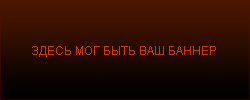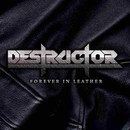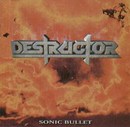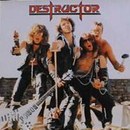Born out of the hard rock and heavy metal of the late 1970s and early '80s, Pat Woloweicki, Dave Just, and Paul Habat joined forces to create and play music that was not unlike other youth across the planet but was yet to have the title of thrash metal. Born of raw energy, loud guitars, and fast drums, Destructor took form. Being mutual high school friends, they found a common bond, and now surnamed Pat Rabid, Dave Overkill, and Paul Warhead, they began to pursue the lifelong dream of being in a band that would come to change the landscape of music previous to their musical heroes.















Having played with drummers Greg Kanios and Don Payne in the embryonic stages from 1982-1983, they finally met up with Matt "Flammable" Schindelar, who was introduced by a mutual friend, Ian Shipley, who would later join the Cleveland band Breaker. Matt played in a band with Ian named Hellion along with vocalist Jim Hamar, who also joined Breaker. With Matt Flammable, the band Destructor was now complete, and in early 1984, Destructor arose onto the Cleveland, Ohio music scene. The first demo, known as Smash Your Skulls with Power, was made from rehearsal recordings and circulated across the world, as many other likeminded bands did, as well.
These were the days previous to the internet, and bands found their fans through tape trading and small fan-based fanzines that existed in every music scene across the planet. After writing songs from 1982 -1984, it was time for Destructor to play their first show, opening for the Manimals at the Pop Shop, which was a club in the basement of the Cleveland Agora. The show took place on October 20th, 1984. Directly after leaving the stage, the band was approached by Bill Peters, an independent record producer from the Cleveland area, and was asked "Do you guys want to make a record?" To which the reply was "Fuck yeah!"
Originally intended to just be a vinyl EP advertised as Pounding Evil, it was quickly changed to a full-length record titled Maximum Destruction. This was to be the second full record released on Bill Peters' record label, Auburn Records. The record was recorded at Suma recording studio operated by Paul Hammond, whose father, Ken Hammond, recorded the likes of Grand Funk Railroad as well as many other gold and platinum artists. After the second show, it was decided that Destructor would replace Paul Habat with Dave Iannicca. Dave "Holocaust" Iannicca was also a high school friend and was always around, waiting and eager to have the chance to play with the band. Having only three weeks in the band, Dave Holocaust recorded the bass guitar on the Maximum Destruction sessions. The two-week sessions were completed in the summer of 1985, and the record was released on Auburn Records in December of 1985. Many shows ensued, and having shared the stage with bands such as Slayer, Nasty Savage, Megadeth, Overkill, Voivod, Celtic Frost, Anthrax, and many more, Destructor planted the flag of Cleveland thrash metal!
In 1986, Maximum Destruction was licensed to the overseas label Roadrunner Records and the sales flourished. In addition, the band did a new recording of the song "Pounding Evil" for the compilation record Speed Kills 2, under the company One Flag Records. The future looked bright for Destructor, and the writing of more songs ensued through 1985-1987 and brought record label attention from Island Records. A deal was proposed to the band for a major label release, and recording had begun for a second album in the summer of 1987 at Beachwood Studios. The record was unfortunately never completed after the murder of bass player Dave Iannicca on New Year's Eve of 1987/88, and the band was subsequently passed over by Island Records. The loss of Dave Holocaust reverberates around the world and brings about many changes for Destructor and the entire Cleveland metal scene.
With the loss of their bandmate and major label record deal, it was apparent that there was a long and hard road ahead mentally and emotionally for Destructor. The band enlisted Brook Hodges, a bassist from Chicago who auditioned for Metallica after Cliff Burton’s untimely death. Brook Damage was made a member, and together, the band of metal maniacs set forth to reclaim their throne. Things seemed good, but the landscape was changing in the United States by the late 1980s, and watered-down hair metal and subsequently the grunge movement were to take the limelight from the underground metal scenes around the country.
By 1989, Brook Hodges leaves to join the band Breaker. This time, in the aftermath of losing seemingly everything the band had worked for found, Matt Schindelar moved on to take leave, as well. Time passed, but Overkill and Rabid stayed together, refusing the dream's permission to die.
In 1992, the band took life once again, with Pat Rabid and Dave Overkill recruiting the likes of Tim Green on bass and Eric Beers on drums. The band rehearses and plays a big show with the band Overkill, but this lineup was only to last a couple of short months and the almost 10-year run was seemingly lost. Destructor finally hangs up the leathers.
In 1999, 16 years after Destructor formed, a German music magazine named Snakepit found Dave Overkill and asked for an interview. Keep in mind that real heavy metal was all but dead in the United States through the '90s but was still alive and starting to thrive again in Europe. Frank Stover, who conducted the interview, gave new life to the name Destructor, and the band reunited following the publication. Destructor, having enlisted Eric Reineke on bass, began to re-record what was to be the band's second record, originally titled Decibel Casualties. The band's first self-funded recording was produced at Suma recording studio. Having little luck soliciting record labels at the time, the album was never released. The band still did small tours and plunged forward. After a couple of years, Eric parted ways with the band, making way for new bassist Jamie Walters. By this time, the French record label Listenable Records had struck a deal to reissue the Maximum Destruction sessions' alternative mix. Jamie Boulder came from the band Boulder. Through all of this time, the record label Auburn Records was retired, as well, and both parties seemed to find each other again at the end of the '90s.
Having a new chance at giving music to the world, the two parties joined forces once again, and the record Sonic Bullet, which was recorded by Don Depew of the band Breaker, was released in 2003.
Sonic Bullet was the first real Destructor release since 1987 and was a combination of a couple of new songs and some material back from the old days. The Auburn release put the band back on the map. The band would find themselves embarking on their first overseas trip to play the prestigious Bang Your Head Festival. Upon returning, the band began to record Forever in Leather, which was released on Auburn Records in 2007.
Writing new songs once again and continuing to play shows regionally and in Europe, Destructor were finding that heavy metal was, in fact, very much alive and well and thriving worldwide. After another 10-year run and a handful of various CD and vinyl record releases, Pat Rabid decided to part ways with the band, and Jamie Boulder followed suit, as well, pursuing his solo interests in the creation of his band Midnight.
Nick Giannakos would now partner with Dave Just to complete the guitar attack, but now Matt Schindelar would find himself taking a leave of absence and Dave would bring in longtime friends Ed Stevens on bass and Chris Dora on drums to record the Anvil song "Bedroom Game" to be released on Skol Records' Anvil tribute record Strong as Steel. Matt rejoining the band afterwards brought along the talents of Tim Fredrick on bass. Dave Overkill, Matt Flammable, Nick Annihilator, and Tim Hammer forged onward, having signed a worldwide record deal with Pure Steel Records out of Germany. Two releases follow from the deal: first, the album Back In Bondage in 2016, and then Decibel Casualties in 2017. Now, Destructor are completing songwriting for their first album with Hells Headbangers.